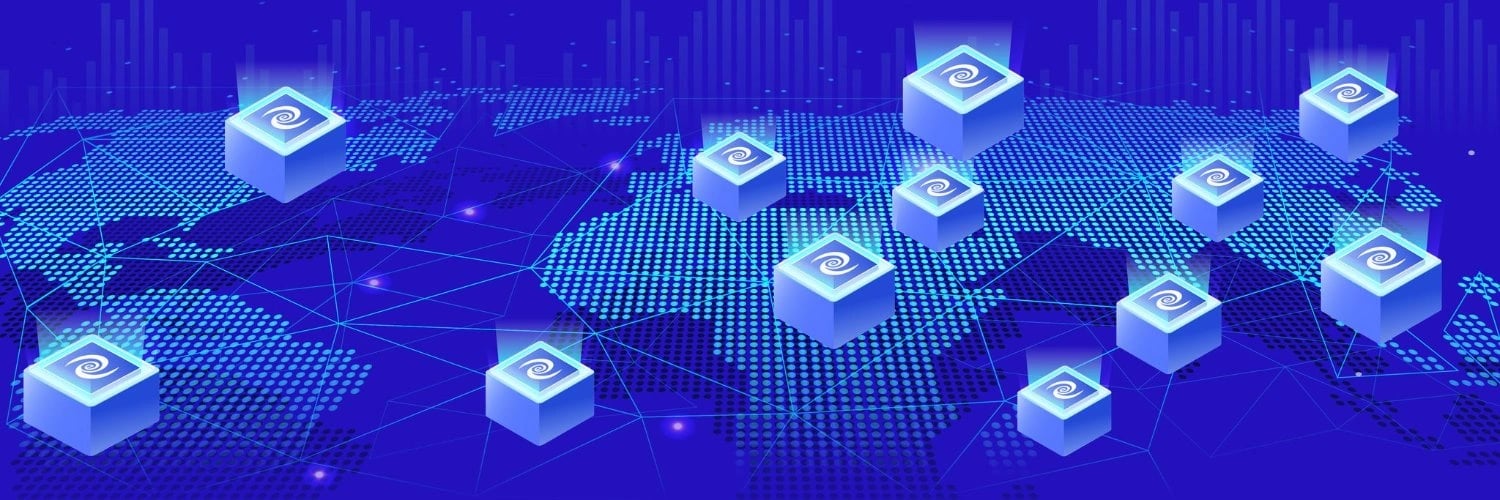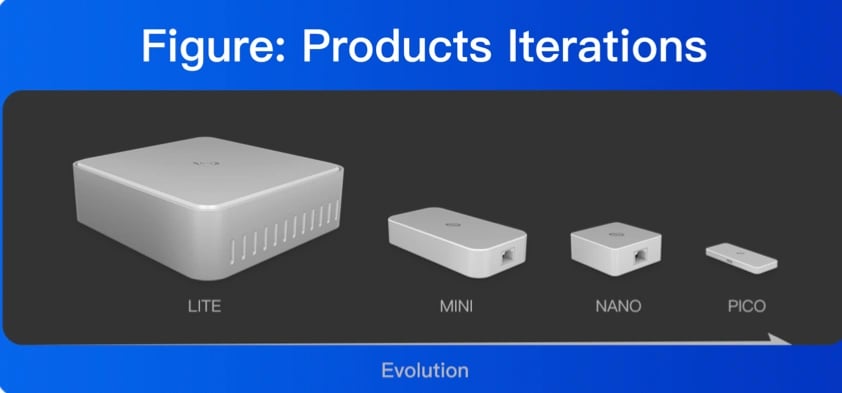订阅 wiki
Share wiki
Bookmark
Deeper Network
0%
Deeper Network
Deeper Network 是一个去中心化的区块链平台,它集成了安全性、区块链技术和共享经济,以支持Web3基础设施。[1][2]
概述
Deeper Network Inc. 由 Russell Liu 于 2018 年在硅谷创立,旨在开发一种集成了区块链、网络安全和共享经济的去中心化互联网基础设施。该公司专注于通过允许个人控制其数据和访问全球网络信息来增强用户隐私。
Deeper Network 运营着一个拥有超过 175,000 个节点的点对点网络及其第六代硬件单元 Deeper Connect。该项目建立在 Polkadot 之上,入选 Substrate Builder's Program 并获得了 Web3 资助,以助力 Polkadot 的基础设施。[3][1][2][4]

历史
2018
Deeper Network于2018年在硅谷成立,旨在开发AtomOS(一种无锁网络操作系统)和Trident协议(一种使用区块链)的去中心化通信协议。该公司还创建了Deeper Connect原型,这是一个基于区块链的家庭安全网关。[3]
2019年
2019年,Deeper Network推出了其公共测试网,采用信用证明(PoCr)共识算法,以鼓励公平参与区块链挖矿,超过1000名用户和200个付费节点参与其中。该公司旨在与Harmony、NKN和SWFT等组织建立合作关系,完成了种子轮融资,并发布了Deeper Connect Lite。[3]
2020年
2020年,Deeper Network完成了Pre-A轮融资,获得了戈壁创投、YOUBI Capital和UVA的支持。该公司开发了Deeper Connect Mini,并在2020年国际消费电子展(CES)上展出,旨在与Republic孵化器、NKN和中国移动合作,研究智能家居的网络安全产品。
Mini在Indiegogo上推出,吸引了超过10,000名支持者,销售额超过145万美元。Deeper Network被Substrate Builders Program接受,并致力于开发更小、更具成本效益的设备Deeper Connect Nano。[3]
2021
2021年,Deeper Network 旨在与 SevenX、Spark Digital Capital 等建立合作伙伴关系,同时推出带有信用证明 (PoCr) 框架的 DPR 测试网。该公司发布了第五代 Deeper Connect Nano,并开发了第六代 Deeper Connect Pico,其中包括 Wi-Fi 支持的更新。
完成了一个用于连接到 DPN 网络的移动应用程序,以及 Ethereum、BSC 和 Deeper Chain 之间的跨链桥。恢复了 DPR 市场的流动性抵押,该公司还推出了加密广告过滤功能。[3]
2022
2022年,Deeper Network 开展了线下推广活动,并整合了 EVM 和 WASM 双合约平台。该公司旨在引入 $DPR 销毁机制,并增加了链上实用程序,包括 API-sidecar 和 Blockscout。实现了对 Wi-Fi 中继模式的支持,以及 Basic Mining 2.0 规则和一系列 Deeper Chain NFT。
Deeper Network 旨在将其节点网络扩展 200%,达到 150 多个国家/地区的 80,000 多个节点,同时通过 Indiegogo 和 Kickstarter 筹集超过 272 万美元。该公司还推出了 EZC 稳定币信用、去中心化预言机和去中心化边缘计算平台 (DEP)。此外,还开发了适用于 iOS 和 Android 的基于订阅的 DPN 移动应用程序。[3]
2023年
2023年,Deeper Network推出了Deeper Connect Air。该公司旨在推出广告去中心化系统信用(ADSC),该项目旨在改变传统的在线广告模式。[5][6]
产品
Deeper Chain
Deeper Chain 是一个在 Substrate 框架上开发的区块链平台,旨在增强去中心化网络。它致力于为去中心化应用程序 (dApps)和智能合约提供安全且可扩展的环境。
主要目标包括确保安全性、实现高交易吞吐量、保持低延迟、促进不同区块链网络之间的互操作性以及实现社区驱动的治理。[10][11]
Deeper Connect
Deeper Network提供Deeper Connect,这是一个旨在增强互联网安全和自由的区块链解决方案。它的即插即用设置不需要任何技术知识,并提供诸如规避审查和网络攻击保护等功能。
产品线包括Lite、Mini、Nano和Pico版本,每个版本都设计为作为去中心化网络中的节点和防火墙运行,确保用户数据安全,同时阻止广告。[7]
 AtomOS
AtomOS

Deeper Network 提供 AtomOS,这是一种无锁网络操作系统,旨在提供高可用性、高性能和可扩展性。该操作系统是 Deeper Connect 网络安全功能的基础。[7]
Trident 协议
Deeper Network 的 Trident 协议旨在提供一个去中心化的通信框架,以增强安全性和用户体验。它采用自适应隧道和智能路由来解决网络审查问题,保护数据传输安全,优化带宽使用,并减少延迟。该协议结合了数据加密和拥塞控制等技术来实现这些目标。[7]
IP多路复用
Deeper Network的IP多路复用技术旨在通过自动调整其IP地址,促进Deeper Connect设备的无缝即插即用体验,从而无需手动配置。[7]
去中心化私有网络 (DPN)
去中心化私有网络 (DPN) 是一个点对点的带宽共享网络,旨在绕过审查并维护用户隐私。它作为一个无服务器和分布式系统运行,有助于防止数据记录或黑客攻击。
在这个网络中,节点运营商既是客户端也是服务器,通过贡献带宽获得奖励,这旨在增强网络的稳健性。DPN 是 Deeper 区块链生态系统中的一个重要应用,促进了去中心化的共享经济和个人数据主权。[7]
广告去中心化系统信用 (ADSC)
广告去中心化系统信用 (ADSC) 旨在通过去中心化技术增强 Deeper Network 内的在线广告。它力求在允许广告商有效接触目标受众的同时,提高用户对其个人数据的控制权。
ADSC 与 Deeper Network 的去中心化专用网络 (DPN) 集成,使用户能够通过广告互动赚取代币,从而可能创造新的收入来源。其区块链基础旨在确保透明度并降低欺诈风险,而其模块化设计支持可扩展性和未来集成。[5]
去中心化边缘平台 (DEP)
去中心化边缘平台 (DEP) 旨在利用 Deeper 设备节点进行去中心化任务执行。每个节点监控事件并根据特定应用程序参数启动工作流程。
节点设计用于支持各种 Web2 和 Web3 应用程序,使它们能够通过提供服务来赚取奖励。 DEP 促进了新型应用程序形式的开发,例如预测服务和邮件系统。[7]
D-tube
D-tube 是一个去中心化的视频平台,旨在赋能 Web3 框架内的内容创作者。通过利用去中心化边缘平台 (DEP) 的安全功能,它提供安全的数据存储和高效的流量分配。
与传统的 Web2 平台相比,D-tube 致力于通过链下运营和链上 NFT 证书来增强创作者的自主权。它采用观看即赚和创作即赚的机制来促进创作者及其受众的参与,从而培养一个去中心化的创作环境。[7]
D-chat
D-chat是一个去中心化的Web3聊天应用程序,它利用去中心化边缘平台(DEP)实现高效的节点部署,并利用去中心化私有网络(DPN)实现安全的消息传递。它的目标是让用户更好地控制自己的身份和数据,允许他们管理账户权限和监控聊天内容。
通过将链下加密隧道与链上身份验证相结合,D-chat旨在确保用户保持对其数字内容的所有权。随着Deeper社区的扩展,D-chat计划推出一些项目,以鼓励开发者并扩大其应用程序的范围。[7]
Deeper GPT
Deeper GPT 是一款人工智能助手,旨在提供有关 Deeper Network 产品和服务的信息。它的目标是提供准确的指导,并协助用户解决疑问,随时欢迎提问以获得支持。[8]
代币经济学
Deeper Network Token ($DPR)
DPR是Deeper Network的原生代币,旨在利用NPoW(信用证明)进行激励,而EZC则作为不可转让的内部稳定币运作。DPR可在外部市场使用,减半机制旨在每发行10亿个DPR,挖矿奖励减半,从而促进可持续性和用户参与。[7]
分配
Deeper代币 (DPR) 的总供应量为 100 亿,分配结构如下:
- 社区: 60%
- 私募代币销售: 20%
- 团队: 10%
- 市场运营、合作和代币储备: 5%
- 核心用户 IDO: 5%
未售出的 DPR 代币旨在重新分配到矿池和赏金项目,供社区参与者使用。[7]
效用
DPR代币在 Deeper Network 生态系统中具有多种功能:
- 去中心化私有网络 (DPN):用户可以通过共享闲置带宽来赚取 DPR,旨在激励参与并提高网络性能。
- 去中心化 DNS 服务:DPR 使用户能够购买去中心化域名,从而实现所有权而无需依赖中央机构。
- 去中心化网络安全服务:用户可以使用 DPR 获取 Deeper 节点作为防火墙,旨在防御网络攻击。此外,用户可以通过为网络安全做出贡献来赚取 DPR。
- 去中心化网关服务(dApp 商店):开发者需要质押 DPR 才能托管 dApp,这些 dApp 也可以接受 DPR 作为支付方式。Deeper 旨在从这些交易中收取服务费。
此外,DPR 可以被质押以增强信用积累,并用作在 Deeper 链上执行 智能合约 的燃料。[9]
治理
Deeper Network采用链上治理,允许用户根据信用评分而非代币对提案进行投票。用户只有在信用评分达到特定阈值时才有资格投票,旨在减少大型利益相关者的影响。这种方法需要时间和精力来建立信用评分,从而在用户之间促进更公平的治理结构,同时仍使较大的贡献者能够保持成比例的投票权。[7]
发现错误了吗?
